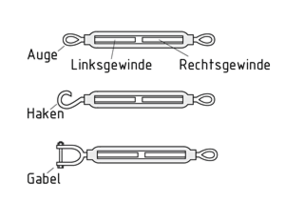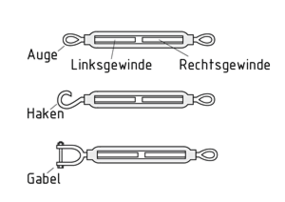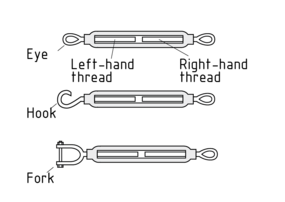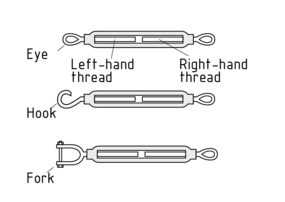
Choose one
or multiple languages
0,1,1
- German
- English
- Chinese
- Spanish
Clamping element

Clamping elements are a type of bolt/screw connection. A distinction is made between turnbuckles and stretching screws.
Turnbuckles comprise two nuts joined by connecting pieces to form a frame into which two bolts with eyes or hooks are screwed. One Nut has a right-hand thread and the other a left-hand thread. Turnbuckles are used to tension cables or wires. Since they can generate tensile loads amounting to many tonnes depending on thread and size, they are used in applications such as bridge building and securing heavy loads.
A stretching screw is a double screw with one left-hand and one right-hand thread. This enables it to connect two components with corresponding female threads. The connecting tensile stress increases or decreases depending on the direction in which the screw is turned. The tensioning screw is operated by means of a central hexagon.
Spannelement

Spannelemente gehören zu den Schraubenverbindungselementen. Unterschieden werden Spannschlösser und Spannschrauben.
Das Spannschloss (Spannhaken) wird von einer mit Stegen verbundenen Doppelmutter gebildet, in der sich zwei Schrauben mit Ösen oder Haken bewegen. Die eine hat ein Rechts- und die andere ein Linksgewinde. Spannschlösser dienen dem Verspannen von Seilen oder Drähten. Weil durch sie je nach Gewinde und Größe viele Tonnen Zuglast erzeugt werden können, kommen sie etwa beim Brückenbau oder zum Sichern schwerer Lasten zum Einsatz.
Die Spannschraube besteht aus einer Doppelschraube, die ein Links- und ein Rechtsgewinde hat. Damit kann sie zwei Bauteile verbinden, die ein entsprechendes Innengewinde haben. Je nach Richtung, in die die Schraube gedreht wird, steigt oder sinkt die verbindende Zugspannung. Bedient wird die Spannschraube über einen Sechskant in ihrer Mitte.
夹紧件

夹紧件是一种螺栓/螺钉连接。松紧螺丝扣和张拉螺钉间存在着区别。
松紧螺丝扣由两个螺母组成,它们通过连接件组合起来,构成一个框架,其中旋有两个带螺丝眼或螺丝钩的螺栓。一个螺母有右旋螺纹,另一个螺母有左旋螺纹。松紧螺丝扣用来拉紧链或线。由于基于螺纹和尺寸,松紧螺丝扣可产生几吨的拉力,因此它们主要在桥建筑和保证较重载荷的情况下使用。
张拉螺钉是一个双螺钉,它同时具有左旋和右旋螺纹。这使得它可采用相对母螺纹来同时连接两个部件。螺钉转动的方向决定了连接拉力是增多或是减少。张拉螺钉可通过中心的六角螺母来操作。
夹紧件
近义词
松紧螺丝扣
张拉螺钉
Elemento de sujeción

Los elementos de sujeción son un tipo de conexión de perno/tornillo. Se debe distinguir entre tensores y tornillos de estiramiento.
Los tensores comprenden dos tuercas unidas por piezas de conexión para formar un marco en el cual dos pernos con ojuelos o ganchos son atornillados. Una tuerca tiene una rosca a la derecha y la otra una rosca a la izquierda. Los tensores se usan para tensar cables o alambres. Debido a que pueden generar cargas con tensión que sumen varias toneladas dependiendo de la rosca y el tamaño, se usan en aplicaciones como construcción de puentes y para fijar cargas pesadas.
Un tornillo de estiramiento es un tornillo doble con una rosca a la izquierda y una rosca a la derecha. Esto permite conectar dos componentes con roscas hembra correspondientes. El esfuerzo de conexión a tensión se incrementa o disminuye dependiendo de la dirección en que se gire el tornillo. El tornillo de tensión es operado por medio de un hexágono central.
Elementos de sujeción
